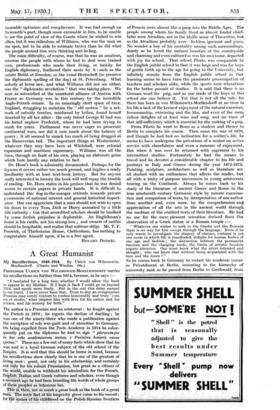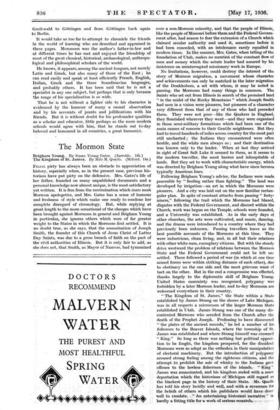A Great Humanist
PROFESSOR ULRICIi VON Wri.ane0WITZ-MOELLENDORFF carries his recollectioni no fiirtherthan 1914, because, as he says :=— " I hesitated fora lOng tinie whether I would allow the book to appear in my lifetime: - -If.I kept it back 'I- could go on beyond 1914; and speak more freely. • But in the end this delay, seemed to me-timid. -I•hava never been that. Even to-day an octogenarian Prussian may surely venture to confass honourably and truly ' cum ira et studio,' -what inspires him With love for" his nation and his science, and his anxiety for both."
The anthor is a Prussian and an aristocrat : he fought against the Frinek in 1870 ; he regrets the decline of duelling ; he
was one of the ninety:thiee who nuide a' publication against the ascription of Sole war-guilt and of atrocities' to Germany. On being expelled .6min-the Paris Academy in 1914 he subse- quently put on the diplomas' he had to sign "- pleraranque in labc orbe acadaniarnin Sdeins, e Parisina honOrii cause ' ejectus." These are a-fewout- of many facts which show-that he was and is- a lOyal German subject of the old school -of the Enipiire. It is well that-this should be borne in mind, beetiuse his recollections show clearly that he is one of the greatest of living men : great, not only in his scholarship, and certainly not only for his robukt Pinssitinisrn-, but great as a citizen of the World, unable to withhold hisrlidniiratitin for French; English, Italian and Greek.eultures and Seholars; even though..
a moment ago he had-been Vranding the Words of whole grOupti of the4e pIea as infiithOuilieS. 7
-
Pis is en; not so gieat book at the honk of a great man. The mere'fact of his lengeVitY iiVel value to his*recoid- for the scenes of his chili/Mod' on the Polish-RuSsian frontiers : of Prussia seem almost like a peep into the Middle Ages. The people among whom his family lived as almost feudal chief-
tains were Arcadian, not in the idyllic sense of Theocritus, but as. the Arcadians probably were—feckless, ignorant and gross, No wonder a boy of his mentality among such surroundings, dearly as he loved the natural beauties of the countryside and charming and even cultured as was his own home, departed with joy for school. That school, Pforte, was comparable to the English public school in that it was large and was for boys of gentle birth up to the age for going to the University, but infinitely remote from the English public school in that learning seems to have been the passionate preoccupation of teachers and scholars alike, while the sports were relaxations for the better pursuit of studies. It is said that there is no German word for prig, and as one reads of the boys at this • school one can believe it. Yet that is not all the tale, for there has been in von Wilamowitz-Moellendoilf at no time in his life a lack of the keenest enjoyment of the natural exercises, horsemanship, swimming and the like, and even of the more indoor delights of at least wine and song, and no trace of that self-sufficiency which is essential for the making of a prig.
From Pforte he went to Bonn as a student and thence to Berlin to complete his course. Then came the war of 1870,-
and though he had had no inclination for a soldier's life, he seems to have undergone the privations of a ranker on active service with cheerfulness and even a measure of enjoyment. But when it was over he returned with eagerness to his intermitted studies. Fortunately he had the means to travel and he devotes a considerable chapter to his life and journeys in Italy and Greece during the year 1872-1873. Painting, sculpture, architecture as well as literature are all studied with an enthusiasm that affects the reader, but all with a unity of purpose uncommon in young aristocrats touring on the Continent. Always he comes back to his study of the literature of ancient Greece and Rome in the
true nineteenth century Germanic style by minute examina- tion and comparison of texts, by interpretation of one author from another and, even more, by the comprehension and, appreciation of all the arts in the ancient world through the medium of the crabbed texts of their literature. He had no use for the mere pleasant sensation derived from the observation of a Greek statue or a Roman temple :— " Whatever one wishes to seek in the Greeks and the Romans there is no way for him except through the language. Even if he only wants to investigate 'the drapery of statues, costume is yet one mode in which fife is manifested, definite for hurOan bodies of one age and fashion ; the distinction between the permanent function and the changing mode, the limits of artistic freedom require attention. ' One must know what the artist intended and thought ; who can know that without being acquainted with the men and the times 7 " So he comes back to Germany to restart his academic career as Privatdozent at Berlin, mounting in the hierarchy of university rank as he passed from Berlin to Greifswald, from Greifswald to Gottingen and from Gottingen back again W Berlin.
It would -take us too far to attempt to chronicle the friends in the world of learning who are described and appraised in
these pages. Mommsen was the author's father-in-law and at different times he 'has met and enjoyed the friendship of most of the great classical, historical, archaeological, anthropo- lOgical and philosophical scholars of the world. - He knows, it appears, among the tongues, not merely Latin and Greek, but also many of those of the East ; he
can read easily and speak' at least efficiently French, English, Italian, Greek and the three Scandinavian languages, and probably others. It has been said that he is not a specialist in any one subject, hut perhaps that is only because
to range of his specialization is so wide. - .. . . .
That he is not without a lighter side to his character is evidenced by the humour of many a casual observation and by his accounts of jaunts and jollifications with his friends. But it is witheut doubt for his profoimder qualities as a scholar and educator, little perhaps as the more modern schools would agree with him, that he stands out to-day beloved and honoured in all countries, a geat humanist.
o is r















































 Previous page
Previous page